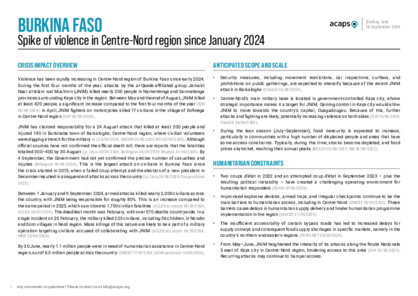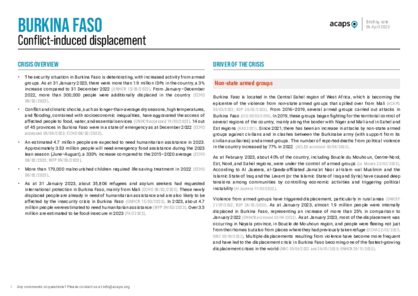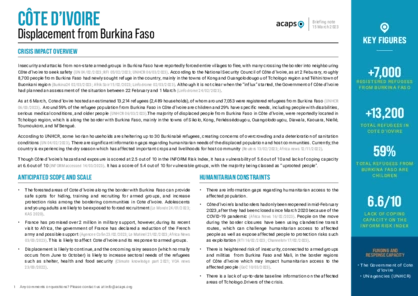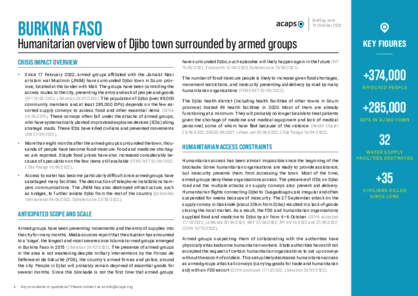Latest updates on country situation
30 September 2025
Violence and insecurity in Burkina Faso continue to force thousands of people to seek refuge in neighbouring Mali. Between April–September 2025, nearly 51,000 Burkinabè refugees arrived in Koro cercle (Bandiagara), with 613 people arriving per day to flee escalating violence across the border. This has doubled the refugee population, straining limited services. Families are sheltering in overcrowded schools, potentially disrupting children’s education as the academic year begins in October. Health facilities lack the capacity to meet growing maternal and reproductive health needs, with the main hospital operating without reliable electricity for surgeries. Protection risks are intensifying for women and children in makeshift shelters, while WASH infrastructure remains severely inadequate. With insecurity continuing to drive displacement, Koro could be hosting up to 110,000 refugees by the end of September, outnumbering the host population. Refugees and host communities urgently need assistance with shelter, WASH services, healthcare, and protection mechanisms. (UNHCR 25/09/2025, UNHCR 22/09/2025, UNHCR 19/09/2025)
17 March 2025
The conflict in Burkina Faso continues to expose civilians to the serious protection risks posed by the various conflict parties, including non-state armed groups, the Burkinabé security and defence forces, and their auxiliaries, the Volontaires pour la défense de la patrie (VDP). In early March, an attack attributed to the VDP in Solenzo (Boucle du Mouhoun) killed dozens of civilians, mostly from the Fulani community, which they accuse of supporting non-state armed groups. These non-state armed groups continue to target civilians, blockading cities for months or even years. This further limits access to food and basic services. Multiple displacement, family separation, psychosocial distress, school dropouts, and children’s forced recruitment in armed groups heighten protection needs for the affected people. As the conflict enters its ninth year, humanitarian needs persist amid increasing attacks on civilians and human rights violations by the conflict parties. (HRW 14/03/2025, GCR2P 14/03/2025, UNICEF 22/02/2025)
22 October 2024
Conflict between non-state armed groups and Burkinabe defence and security forces in Djibo city, northern Burkina Faso, has led to a blockade by the former since February 2022. This blockade has significantly affected humanitarian organisations and the lives of residents, resulting in displacements, deaths, injuries, and access constraints. The blockade has also cut off access to essential supplies and services and restricted people’s movement. On 21 October 2024, Médecins Sans Frontières (MSF) announced a temporary suspension of its activities in Djibo as a result of the recurrent incidents targeting health centres, water distribution points, and their facilities and staff. This suspension will worsen the already dire situation, as MSF was providing critical healthcare services in the region. (MSF 21/10/2024, HRW 15/06/2023, MSF 05/05/2023)
13 August 2024
On 5 August 2024, attacks in several villages in eastern Nouna commune displaced over 6,600 people to Nouna centre, Kossi province, Boucle du Mouhoun region. The attackers looted food stores, livestock, and other valuables and threatened residents to leave the area. Most of the newly displaced people are living with host families, while some are residing in administrative buildings. The IDPs urgently need assistance in the form of food, shelter, healthcare (especially psychological support), and NFIs. (OCHA 13/08/2024)
23 July 2024
On 17 July 2024, armed groups attacked the city of Djibo in northern Burkina Faso. The groups shot at Médecins Sans Frontiéres offices but did not harm any of the staff and patients. The attack damaged health structures, a water distribution site, and a communications tower. Members of the group also looted and calcined a storage warehouse holding food and other supplies and burnt tents in a displacement site. Djibo, located near three border zones (Burkina Faso, Mali, Niger), has been under blockade for almost two years, with difficult access and recurrent attacks on supply convoys in the area. (Le Monde 19/07/2024, RFI 19/07/2024)
28 May 2024
On 22 May 2024, armed groups launched a series of attacks in several localities of Burkina Faso. In Partiaga in Est region, the attacks killed 13 civilians and seven Volontaires pour la Défense de la Patrie (members of an auxiliary force supporting the country’s armed forces) and led to the looting of shops. In Nord region, the attacks hit several villages around the city of Séguénéga, killing about 70 civilians (including a humanitarian worker). People have fled to the city of Séguénéga. These incidents are occurring in a context of humanitarian crisis in Burkina Faso, where over two million people are already displaced. (Journal du Niger 24/05/2024, OCHA 27/05/2024)
21 May 2024
On 13 and 16 May 2024, media reports highlighted the killing of civilians by members of the armed forces escorting supply convoys in Burkina Faso. About 150 villagers were killed between Dori and Mansila in Sahel region and 100 between Fada N’gourma and Tankoualou in Est region. The increasing targeting of civilians, humanitarian workers, and supply roads affects the humanitarian space, while the country counts about 6.3 million people in need of assistance. Improvised explosive devices, administrative hurdles, and other access restrictions also hinder the delivery of assistance. (ECHO 21/05/2024, France 24 17/05/2024)
current crises
in
Burkina Faso
These crises have been identified through the INFORM Severity Index, a tool for measuring and comparing the severity of humanitarian crises globally.
BFA002 - Conflict and Climatic Shocks
Last updated 31/01/2026
Drivers
Conflict/ Violence
Drought/drier conditions
Floods
Crisis level
Country
Severity level
4.1 Very High
Access constraints
4.0
Analysis products
on
Burkina Faso
28 May 2025
Burkina Faso: Humanitarian needs in blockaded areas
DOCUMENT / PDF / 863 KB
This report aims to bring renewed attention to a severely underreported humanitarian situation that has persisted over the past year. It analyses the humanitarian needs of people living in towns and villages blockaded by non-state armed groups (NSAGs) in Burkina Faso.
18 September 2024
Burkina Faso: spike of violence in Centre-Nord region since January 2024
DOCUMENT / PDF / 784 KB
Violence has been rapidly increasing in Centre-Nord region of Burkina Faso since early 2024. During the first four months of the year, attacks by the al-Qaeda-affiliated group Jama’at Nasr al-Islam wal Muslimin (JNIM) killed nearly 200 people in Namentenga and Sanmatenga provinces surrounding Kaya city in the region.
06 April 2023
Burkina Faso: Conflict-induced displacement
DOCUMENT / PDF / 409 KB
The security situation in Burkina Faso is deteriorating, with increased activity from armed groups. Conflict and climatic shocks, combined with socioeconomic inequalities, have aggravated the access of affected people to food, water, and essential services. An estimated 4.7 million people are expected to need humanitarian assistance in 2023.
15 March 2023
Côte d’Ivoire: Displacement from Burkina Faso
DOCUMENT / PDF / 366 KB
Insecurity and attacks from non-state armed groups in Burkina Faso have reportedly forced entire villages to flee, with many crossing the border into neighbouring Côte d’Ivoire to seek safety. According to the National Security Council of Côte d’Ivoire, as at 2 Feburary, roughly 8,700 people from Burkina Faso had newly sought refuge in the country.
Attached resources
19 October 2022
Burkina Faso: Humanitarian overview of Djibo town
DOCUMENT / PDF / 204 KB
Since 17 February 2022, armed groups affiliated with the Jama’at Nasr al-Islam wal Muslimin have surrounded Djibo town in Soum province, located at the border with Mali. The groups have been controlling the access routes to the city, preventing the entry and exit of people and goods.






